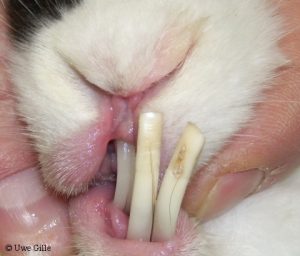Actually, all rabbits need regular dental checks — at least every 6 months! Rabbits are very well adapted to eat rough, coarse vegetation. However, there are a number of things that can go wrong and that need to be detected as early as possible to have the best chance of fixing them.
What types of teeth do rabbits have?
As a result of their lifestyle, rabbits have open rooted teeth. This means that their teeth continue to grow throughout life – so (in theory) they grow back as fast as they are ground down by chewing rough grass or hay.
Rabbits have only 28 teeth – 2 main incisors top and bottom (the big teeth you see at the front), 2 peg teeth (little tiny incisors beside the main top ones), and 22 premolars and molars (the grinders at the back – each side has 6 on the top and 5 on the bottom). Between the two is a diastema – a gap separating the incisors from the premolars.
The incisor teeth are used to cut grass and the molars for chewing it. The incisors, in particular, grow incredibly fast – between 2.0 and 2.4mm per week! This means that any problems can become severe very, very fast, as the teeth keep growing. It is possible, for example, for a massively overgrown incisor to grow round in a circle and embed itself in the skull…
So, what problems can rabbits get?
The most common problem rabbits suffer from is malocclusion – this is where 2 teeth that are supposed to meet in the middle don’t meet quite square, leading to asymmetrical wear. This can result in abnormal overgrowth of the incisors, and sharp spurs, points and edges on the molars that cut the tongue and cheeks when chewing. Although these problems are more common in older rabbits, younger animals may also suffer (this is sometimes called Progressive Syndrome of Acquired Dental Disease, PSADD). The cause is unclear, but it is probably at least partly due to diet – the condition is rare in rabbits who eat mostly hay or grass, but is very common in house-rabbits and those who live on a muesli-style diet.
Other potential problems include tooth infection, which may progress to tooth root abscesses. These occur when the bacteria are able to enter the root of the tooth (often due to either another untreated dental disorder or a fracture of a tooth) and multiply there. This causes severe pain, swelling of the face, and may be fatal if not treated. 
What are the symptoms of dental disease?
Once it becomes severe, symptoms of dental disease are usually obvious – reduction in appetite, selective eating, runny eyes (due to damage to the tear duct), excessive salivation, diarrhoea (due to inadequate chewing causing intestinal upsets) and tooth grinding. In severe cases, the rabbit may stop eating entirely, which is a medical emergency – rabbit guts are intended to work 24/7/365, and if they ever stop it can be very hard to get them started again.
So why does it need checking? Can’t I wait until my rabbit actually has a problem?
By the time the disease has reached this degree of severity, it will require radical treatment to fix it (often involving tooth removal). It is far, far better to check the teeth regularly!
Can I check the teeth at home?
You certainly can – and we encourage it. Check the incisor teeth, if they aren’t lining up, or if they seem uneven or asymmetrical, get your rabbit checked out by your vet. However, the back teeth cannot be checked, even superficially, without special equipment. This is because the diastema (the gap between incisors and premolars) is blocked by an infolding of the cheeks, so you cannot see the premolars or molars from the outside. The only way to check is for your vet to use a scope – a device like a speculum that they can use to part the folds of cheek tissue and look at the surfaces of the teeth. This isn’t perfect – in a conscious rabbit, not every part of every tooth can be seen – but it allows most problems to be detected with no anaesthetic needed.
What can be done if there is a problem?
Most dental problems in rabbits can be managed with dental surgery under anaesthesia to grind down sharp edges and spurs, and burr away overgrown teeth. It is important to remember, though, that because rabbits’ teeth grow so fast, regular repeat treatments often needed – however, severely deformed or overgrown incisors can sometimes be surgically removed so that they don’t grow back (but then you need to watch out for the one opposite!).
If you think your rabbit may have a dental problem, make an appointment and get them checked out. Even if they seem fine, it is important to get their teeth checked at least every six months.
